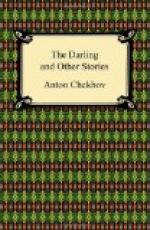At the University his tall figure and physical strength had won him the nickname of “the pounder” among the students. He had taken his degree with the Laptev brothers in the faculty of philology—then he went in for science and now had the degree of magister in chemistry. But he had never given a lecture or even been a demonstrator. He taught physics and natural history in the modern school, and in two girls’ high schools. He was enthusiastic over his pupils, especially the girls, and used to maintain that a remarkable generation was growing up. At home he spent his time studying sociology and Russian history, as well as chemistry, and he sometimes published brief notes in the newspapers and magazines, signing them “Y.” When he talked of some botanical or zoological subject, he spoke like an historian; when he was discussing some historical question, he approached it as a man of science.
Kish, nicknamed “the eternal student,” was also like one of the family at the Laptevs’. He had been for three years studying medicine. Then he took up mathematics, and spent two years over each year’s course. His father, a provincial druggist, used to send him forty roubles a month, to which his mother, without his father’s knowledge, added another ten. And this sum was not only sufficient for his board and lodging, but even for such luxuries as an overcoat lined with Polish beaver, gloves, scent, and photographs (he often had photographs taken of himself and used to distribute them among his friends). He was neat and demure, slightly bald, with golden side-whiskers, and he had the air of a man nearly always ready to oblige. He was always busy looking after other people’s affairs. At one time he would be rushing about with a subscription list; at another time he would be freezing in the early morning at a ticket office to buy tickets for ladies of his acquaintance, or at somebody’s request would be ordering a wreath or a bouquet. People simply said of him: “Kish will go, Kish will do it, Kish will buy it.” He was usually unsuccessful in carrying out his commissions. Reproaches were showered upon him, people frequently forgot to pay him for the things he bought, but he simply sighed in hard cases and never protested. He was never particularly delighted nor disappointed; his stories were always long and boring; and his jokes invariably provoked laughter just because they were not funny. Thus, one day, for instance, intending to make a joke, he said to Pyotr: “Pyotr, you’re not a sturgeon;” and this aroused a general laugh, and he, too, laughed for a long time, much pleased at having made such a successful jest. Whenever one of the professors was buried, he walked in front with the mutes.
Yartsev and Kish usually came in the evening to tea. If the Laptevs were not going to the theatre or a concert, the evening tea lingered on till supper. One evening in February the following conversation took place:




